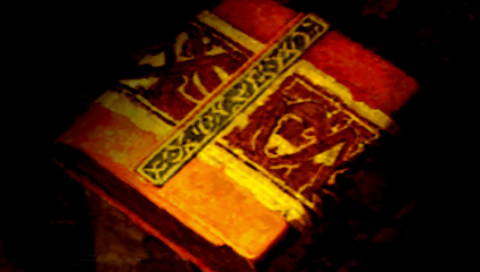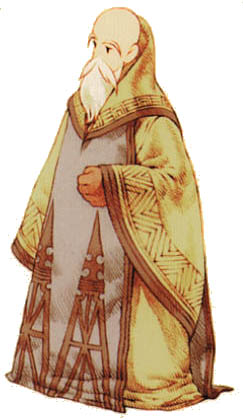Last updated on October 31, 2013
Part One Here. Just to avoid confusion!
As I said, the characters of the world believe in A god, but a false one. The Church of Glabados, as it is called, believe in the teachings of St. Ajora, a sort of Christ figure. He comes on the scene, looks like Christ performing miracles by predicting the poisoning of a well, and sets off to form his own religion. In a vague parody of the Gospel, Ajora obtains thirteen disciples, and displaces the current religion of his time, twelve hundred years before the events of Final Fantasy Tactics (known as Pharism). He predicts the end of the world and apocalypse, and is summarily executed by Church authorities; the tidal wave that happens concurrent with his death establishes his reputation as a holy man and a messiah worthy of worship. He is part of a long line of the continual story of the Zodiac Braves legend in Ivalice, a group of people who arise in times of great peril who gather the zodiac stones together to right great wrongs in the history of Ivalice.
Unfortunately, most of the stories told about St. Ajora are complete hogwash; he ends up being a spy who sells information to the highest bidder, and the thirteen disciples are a ploy by the reigning power to accumulate evidence to execute him. St. Ajora wasn’t a savior, or a God; he was merely a man who manipulated time and history to his own ends. Germonique was one of those disciples. We know of the real story because of Germonique’s Scriptures, a strange analogue to the Gospel of Judas (though I am unsure whether that, in itself, is an actual reference or a mere coincidence).
This is the reason why the Germonique Scriptures are so important and revered in the game, AND are used to revive Hashmalum AND open the gate to Murond Death City, where the resurrection of Ultima occurs – they reveal the true nature of St. Ajora; his false nature made him a suitable host as the body for the demon Ultima. The Scriptures don’t tell us that St. Ajora was demon-possessed, and that the zodiac stones are the key to his resurrection. The Lucavi, an evil force, seek her arrival into the world through the arrival of the greatest falsehood ever to hit Ivalice, and that’s the context. Every story, every tale, every religion was a farce for power. Simon himself says this in his own footnotes for them:
Although many spoke of their existence, none had ever set eyes upon these Scriptures of Germonique. Some might say they are fraudulent, written with the sole purpose of discrediting Saint Ajora. But I know this tome to be authentic.
When I served as an inquisitor for the Church, many others in the Holy Office feared the existence of this work. And the same is no doubt true for the High Confessor. They were all fearful of these writings, for everything contained within them is fact.
After Saint Ajora’s death, the Church, which has capitalized on his considerable influence to seize power for itself, had only one task: to conceal his true nature as a human being. This one fact has to be erased from the annals of history. They needed to ensure that Saint Ajora be remembered as a child of the gods.
Their use of the Zodiac Braves, a legend believed throughout Ivalice, was a stroke of genius. It was a simple feat to convince the people that Saint Ajora had led the Zodiac Braves to defeat a demon. A demon that never existed…
I realize now that I had lost my faith the moment I began to read these Scriptures. And yet I feel no sorrow. Thinking back, I now know that my desire to know the truth was stronger than my faith had ever been.
So does the game tell us directly: the God of Ivalice is mere myth. What is true is spirits and gods, both good and evil, that wage a war under the scenes for the purpose of power. That, my friends, is the story of Final Fantasy Tactics in a nutshell.
For God’s sake, I got the whole story immediately as a ten year old; this doesn’t take that much guess work, and all the information can be found directly in the game. Even without it, it’s pretty clear that the Church is your enemy because it fears what you know and what you will do. That is why Ramza is a heretic! And he is one, by their standards! That’s the point! There is no “God” in the Western Christian sense within Ivalice. This is confirmed in subsequent games within the same setting such as Vagrant Story and Final Fantasy XII, which also show us many disparate powers at play controlling the events and records of history. The winners write the history, and then enforce it with an iron fist.
It may be a selected story, granted, but the myth also covers the nature of Final Fantasy Tactics’ actual metaphysics. It is more complicated than a simple monotheism, but shows a diversity of different powers and faiths all coexisting (like in Shinto). “Faith” and “Brave” merely show faith in either one’s physical or spiritual strength, nothing more. That a white mage communes with holy magic and a black mage with dark magic, or a summoner with spirits from beyond or a time mage with time and space itself shows the diversity of different powers. Heck, I could even throw in geomancers as the power of nature!
Or, to put it another way: faith exists for the blind and the weak. Those who seek truth will find that everything is true, and that power exists to be grasped (hence, your party members’ ability to commune with such spirits). But some will find truth and seek to free those under the spell of power, like Ramza and Simon. Simon knows the power of truth, and he feels guilt for not revealing it earlier; giving the Scriptures to Ramza in his dying breath is his first act of rebellion against a Church that for so long held the truth from him and from the common people.
Even if these weren’t so unerringly clear, our two protagonists still lack any kind of religious faith. Their character development has nothing to do with faith at all. I imagined that would be enough to settle the case, but apparently not.
I am going to assume you see the irony in this situation: I’ve just told you the story directly from the game, and the other presents a preconceived narrative that has little, if anything, to do with the truth. It might feel better, sure, but a pile of inferences and a predetermined narrative line only obscure the truth; agendas do not clear up anything. That doesn’t make it a bad article, certainly, but it also doesn’t justify Christians to reshape the game in their own image. It doesn’t justify calling anything a “God” in Yasumi Matsuno’s world – there isn’t one. It comes from a particular non-occidental cultural context, and though it might contains vestiges of a medieval Western society, they are merely trappings. If you want Christianity in a Japanese game, Dragon Quest is as close as you’re going to get (and even then, it’s a goddess!). Most of Matsuno’s universes hold the same ideas, as in Tactics Ogre’s similar setting. See for yourself, in Matsuno’s own words:
In the current society science has developed to a point where the existence of God itself has become ambiguous, but in the past gods, demons and monsters were a fact, exerting a great influence over people’s lives. Religion, in particular, didn’t mean solely believing in God, but dictated how people should behave, defined their values, to an extent serving as a law code per se. I wanted to make it so that this would be easily understood in the game. In fact, I also meant to include slavery in the story, but you can only make it that much complicated, so I had to give it up along with several other concepts.
Our faith revolves around a sacred text. We are called to accurately reflect that text when we preach the Gospel. How much more should we take care not to misrepresent the intent of others, whether for or against out faith? I would certainly hope to extend the same courtesy to others, believer and nonbeliever alike; to do otherwise misrepresents our call to accurate Biblical ministry.


